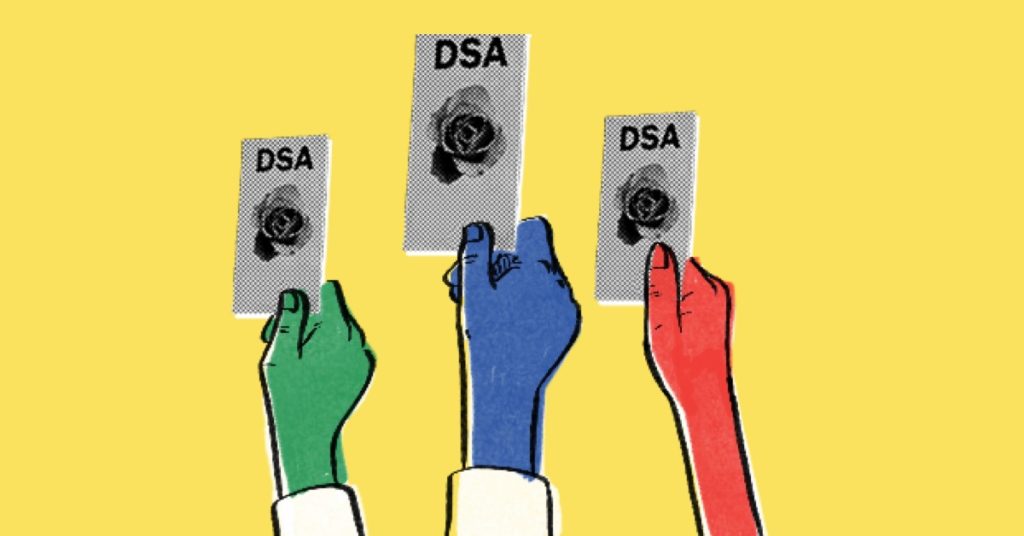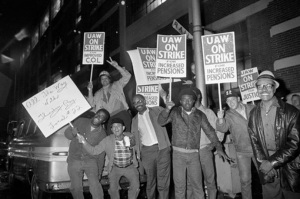The DSA has a problem with class reductionism.
I don’t mean the whole DSA. I don’t mean everyone in the DSA. I don’t even mean most people in the DSA. In fact, I’m in the NYC DSA chapter and do work in their Socialist Feminist working group which is not at all class reductionist.
But the DSA, as a national organization, has a problem with class reductionism, a problem with attracting members of color, and a big problem relating to the current Black-led movement in the streets — and regardless of the great work of particular chapters, working groups, or individuals, this severely limits and slows the participation of the DSA in the current uprising and diverts the organization’s efforts away from its purported goals: the fight for socialism and against oppression.
This problem is primarily, though not exclusively, centered around the sectors of the DSA leadership grouped around Jacobin Magazine. For one, members of Jacobin-affiliated Bread and Roses, formerly Spring Caucus, formerly Momentum occupy positions in National and local leadership. But Jacobin’s leadership goes beyond this: as the largest socialist publication in the U.S., with 2 million hits per month, it plays a central role in organizing the DSA ideologically.
The latest iteration of the DSA’s class reductionism was an internal struggle around a panel featuring Adolph Reed about how “class reductionism doesn’t exist.” But the roots of this problem run deeper, and include the organization’s refusal to take a strong stand against cop unions and its political focus on Bernie Sanders, who tends to reduce systemic racism to a merely economic issue.
If it wants to be an organization that fights for socialism, the DSA must recognize that capitalism and racism go hand in hand. It must separate itself from all class reductionism, as well as liberal identity politics and take up wholeheartedly the current Black-led uprising, lest the DSA become a predominantly white, left pressure group to the Democratic Party.
What Is Class Reductionism?
Class reductionism is the belief that class causes all oppression and, in turn, that economic changes are enough to resolve all forms of oppression. As Sherry Wolf explains, “There’s a caricature of the debate between Marxists and identitarians. Advocates of ID politics say “gender”; Marxists respond, “class.” ID politicos say “gender and race”; Marxists respond, “class, class.” Identitarians say “gender, race, sexuality, disability”; Marxists say, “class, class, class, class.””
Even a cursory look at the work of Marx and early Marxist thinkers demonstrates that this is categorically untrue. Rather, the interaction between oppression and the economic structure have always played an important role in Marxist analysis. In the Communist Manifesto itself, Marx takes up the oppression of women, without reducing it to just a question of class. Lenin’s book “What is to be done?” is in many ways a discussion against class reductionism, discouraging socialists from only focusing on narrow economic demands. And Leon Trotsky strongly encouraged James Cannon to take up Black struggle in the Socialist Workers Party in the U.S. He corresponded regularly with CLR James, who was a Black Trotskyist and important historian who analyzed Black oppression and struggle from a Marxist perspective.
However, it is true that there are currents in Marxism which did become class reductionist and these strains had a massive influence on the history of socialism in the U.S. Eugene Debs, a leader of the Socialist Party in the 20th century, made many important contributions to the U.S. socialist movement. However, on the issue of race and socialism, he said, “There is no Negro question outside of the labor question. The real issue … is not social equality but economic freedom. The class struggle is colorless.” Similarly, Stalin — which viewed LGBTQ people as petty bourgeois deviants and ended attempts to pursue women’s equality — brought class reductionism back to the socialist movement.
On the other hand, identity politics, which arose and gained strength in the past few decades, makes class all but disappear, often conflating exploitation and oppression, which are overlapping but different things. In identity politics, the struggles becomes cultural and rhetorical, rather than material and structural. And capitalism, as a system based on the exploitation of the working class majority and the hyper exploitation of the most oppressed, becomes invisibilized. The Democratic Party has taken up liberal identity politics, cynically pretending to be on the side of oppressed people, while maintaining this system of oppression and exploitation. In its worst iterations, it looks like Kamala-the-Cop pretending she’s on the side of Black people.
But in the face of liberal identity politics which uphold the capitalist system, the solution is not to turn away from politics around the oppression of Black people, women, trans folks, etc. Instead, socialists must do as Lenin suggested and
react to every manifestation of tyranny and oppression, no matter where it appears, no matter what stratum or class of the people it affects…and produce a single picture of police violence and capitalist exploitation; who is able to take advantage of every event, however small, in order to set forth before all his socialist convictions and his democratic demands, in order to clarify for all and everyone the world-historic significance of the struggle for the emancipation of the proletariat.
In other words, socialists should be able to show that there is no liberation in capitalism; a working class, socialist revolution is the path towards liberation for all oppressed and working class people.
“Class-Wide Demands”
The DSA’s most powerful wing, represented by Jacobin and the Bread and Roses caucus, developed a theory of “class-wide demands” — or what is sometimes even more appallingly called “race-blind demands” to justify its political orientation. Two Jacobin/Bread and Roses cadre, Eric Blanc and Jeremy Gong, argue that socialists should “emphasize class-wide demands, or policies that directly benefit all or most of the working class (in a given area or industry) at the expense of the capitalist class.” For this reason, they call for prioritizing these demands over those that specifically address the issues facing those most exploited by capitalism, while at the same time arguing that class-wide economic demands address systemic racism.
In “Beware the Race Reductionist,” which is almost universally quoted in discussions of class-wide demands, Briahna Gray says, “the principal beneficiaries of universal policies would be poor and working class people who would disproportionately be black and brown … Dismissing such policies on the grounds that they aren’t addressing systemic racism is a sleight of hand.” Blanc and Gong interpret this to mean that, “supposedly “race-blind” policies like Medicare for All and a federal jobs guarantee — as Gray rightly argues — actively work to undo both the effects and causes of racism.” In other words, the fight for policies for the working class like Medicare for All is actually a fight against “the effects and causes” of racism.
It’s true people of color are disproportionately affected by a lack of health insurance and would benefit greatly from Medicare for All. Gray, who is primarily arguing against liberal identity politics, is correct to say that we shouldn’t “dismiss these policies” — indeed, we have to support them! However, “class-wide demands” are insufficient to address the particular oppression of Black folks. We have to talk about the legacy of slavery, current discrimination, and racist police violence. We have to talk about the fact that in a racist society, the implementation of “class-wide demands” is executed in a racist way, denying benefits to people of color, like the GI Bill, the New Deal’s Wagner Act, and the Social Security Act.
Jacobin is right to focus on uniting the working class — a working class that is Black, Brown, and queer, as well as straight, white, and cis male. But in order to achieve this unity, we need to fight against every form of oppression as such. Racism is the strongest tool wielded by American capitalists to implement hellish conditions for the working class. So, fighting against racism is a class-wide demand.
Jacobin is also right to highlight the working class’ strategic role in society: it has the ability to stop all of society as well as to provide for it. For this reason, it is a strategic necessity for the working class to take up the struggle against police violence and for Black lives, both to advance the BLM movement and to advance the fight for socialism. Using strikes and work stoppages, the labor movement must play a role in the current uprising and fight against police brutality. This requires the working class to take up the demands of the most oppressed sectors of society. This in turn, strengthens class consciousness and working class unity.
Sanders and “Class-Wide Demands”
Even a cursory reader of Jacobin over the past two years could tell you that Jacobin became obsessed with Bernie Sanders, with countless articles about his many merits. It was the most devout sector of the DSA’s tireless campaign, which included phone-banking, door knocking, and registering people as Democrats to vote for Bernie Sanders. But the “class-wide demands” theory explained by Jacobin is precisely Sanders’ politics.
In 2016, Sanders had a pretty weak position on Black struggle, which resulted in a public call out from Black Lives Matter activists. For the 2020 election, Sanders worked to build up his image as being on the side of Black people and, indeed, huge sectors of Black youth came out to support him. And yet, at their core, his politics are often class reductionist. For example, while some of the Democratic Party candidates promised to pay reparations to Black people for slavery — empty rhetorical gestures, Sanders came out explicitly against this policy. Instead of putting forward a clear proposal for reparations and explaining how capitalist wealth still has its roots in the slave system, Sanders said that there are “better ways” to help Black people than “writing out a check.” He then pivoted back to policies like Medicare for All which he says would disproportionately help Black folks. This is textbook class reductionism.
As a result, the DSA Afro-Socialist Caucus issued a statement asking the DSA to hold off endorsement until Sanders changed his position on reparations. The statement reads:
Should the organization move forward with an endorsement of the Sanders campaign, despite his failure to adopt specific policy stances to address matters of persisting racial injustice and despite his unwillingness to champion reparations to specifically address the experience of the descendants of African slaves, it will risk alienating not just members of color within the organization, but people of color in the communities in which the DSA works.
This demand was ignored and likely had the very effect that people in the Afro-Socialist Caucus claimed it would.
In the midst of the reparations discussion, editor-in-chief of Jacobin and DSA member, Bashkar Sunkara, took a reprehensible approach in an article in The Guardian entitled “To fight racism, we need to think beyond reparations” in which he argues against reparations and for Sanders’ “universal programs.” Sunkara’s politics specifically geared towards Black community stop at affirmative action and a “cultural reckoning,” not any material compensation. Sunkara misses a critical opportunity to talk about the connection between capitalist wealth and the legacy of slavery. And more importantly, Sunkara’s article implicitly denies the possibility that “the many” could be united against the minority of capitalists with a demand around Black rights. Reality is proving Sunkara wrong.
Now, the DSA’s campaign for Sanders is particularly shameful as he is currently campaigning for the openly racist Joe Biden, positions himself against police abolition, and worse still, wants to increase police pay. It is particularly problematic at a moment when the Democratic Party, for whom DSA members register voters, is tear gassing protesters — and as always, running the racist and exploitative system of the United States alongside the Republican Party.
Bad on Black Lives Matter
Furthermore, the DSA has a poor record on the issue of the police and Black struggle. A cop organizer was unknowingly voted into national leadership in 2017. He had not disclosed to DSA that he had worked for the Combined Law Enforcement Associations of Texas (CLEAT), Texas’s largest police union, which represents 21,000 cops. The DSA membership was correctly incensed. Although some members threatened a dues strike and labor activists put out a dissenting statement, the DSA National Political committee did not kick out the former cop organizer. The members of the NPC who were specifically associated with Jacobin’s slate, Momentum, voted to keep the cop organizer in leadership.
What message did that send to the DSA’s Black members and to people who took the streets during the Black Lives Matter movement only a few years before? In the current Black Lives Matter uprising, Jacobin is similarly problematic.
“The Myth of Class Reductionism” Debacle
The recent Adolph Reed fiasco also demonstrates just how class reductionist Jacobin has become. To begin with, Adolph Reed is a self-proclaimed Marxist academic known for problematizing “identity politics” and, in doing so, slipping into class reductionism. Most recently, he wrote a piece for Common Dreams in which he argued against an analysis of race and the coronavirus, saying that it might lead to a return of racial medicine.
Well, what does this have to do with the DSA?
In May, the Lower Manhattan DSA, as well as the Philadelphia DSA, invited Adolph Reed to give a talk entitled “Covid-19 and the dangers of disparity ideology” — claiming that discussing race too much separates “interests of people of color from the wider public.”
In other words, in the midst of the coronavirus pandemic — a pandemic that has disproportionately killed Black people, as well as increased police violence against the Black community, the DSA gave a platform to someone who urged us to speak less about race. As the day of the event approached, the George Floyd uprisings began. It’s no coincidence. After all, it was the coronavirus pandemic and economic crisis which created the conditions for the explosion of rage in the streets. Only a day before the event, the Afro-Socialist Caucus again put out a statement against the event, demanding that it be changed to a debate.
As a result, this event was cancelled in midst of the current uprising. Nevertheless, members of the DSA should seriously question how our organization made itself “friendly” enough to this point of view that two chapters could organize such an event.
But the problem didn’t end there.
Just this month, Jacobin put on an event with Bhaskar Sunkara interviewing Adolph Reed entitled “The Myth of Class Reductionism.” Sunkara and Reed managed to make it through the whole event without mentioning the current Black Lives Matter uprising a single time. They spent about half of the event discussing “what comes after Bernie. ”
The fact that Sunkara did not ask Reed about the uprisings and instead focused on Medicare for All and Sanders highlights the depth of this class reductionist framework. This framework does not allow Sunkara and Reed to see the current uprising as central to a class consciousness proletariat that is clearly on the side of the Black community. It does not allow Sunkara and Reed to see that the lack of Medicare for All, as well as the economic crisis can help create the conditions for an uprising. But the rallying cry of the biggest U.S. uprising of my lifetime that has united much of the working class and oppressed wasn’t a so called “class-wide demand.” It was the Black Lives Matter movement.
Where to Go from Here?
After Sanders’ defeat, an article by Paul Heideman in Jacobin set up a binary choice: “Bernie Sanders is out of the race, but we can’t retreat to the subcultural politics that were hegemonic on the Left before his campaigns began. Mass politics is still our way forward.” To Heideman, mass politics is synonymous with electoral work within the Democratic Party, which has largely remained the focus of the DSA. Even in the midst of the uprising, DSA members receive countless emails on a daily basis telling us that the future of the movement is at the polls. In this sense, some sectors of the DSA are doing the work of the Democratic Party— asking us to take the movement to the polls for a capitalist party.
Yet, in a sense, Heideman is right: it is time for mass politics — but not the type that Jacobin is suggesting. There is mass politics going on in the streets right now, with hundreds of thousands of primarily working class youth taking part. Our mass politics should help organize national and international protests for Black lives. We should organize a national campaign to get cops out of our unions. It’s time to build Black Lives Matter assemblies in our workplaces, schools, and neighborhoods in coordination with Black led community organizations and unions to continue the movement.
And yes, there is a role for national electoral politics, but not within the Democratic Party, which is tear gassing protesters in the streets. The capitalist parties don’t want to fight racism; they profit too much from it. Capitalism and racism go hand in hand. So, it’s high time for DSA candidates to publicly break with the Democratic Party and form a new party, on a socialist ballot line against the party responsible for George Floyd’s murder. The mass politics we need is one that strengthens and deepens Black struggle by connecting it with the strength of the working class in our workplaces, as well as politically opposing the current co-optation by the Democratic Party.
In this sense, we need a strong socialist organization fighting for socialist revolution, because within capitalism there is no liberation. It is time for mass politics, but as the current movement demonstrates, mass politics don’t need to be around so called “class wide demands.” We can unite the working class and oppressed on a massive scale around anti-racism and against the cops.
As socialists, we must recognize that it is the time for mass politics to fight for a world without cops, capitalists, or borders, a world in which Black lives matter.











